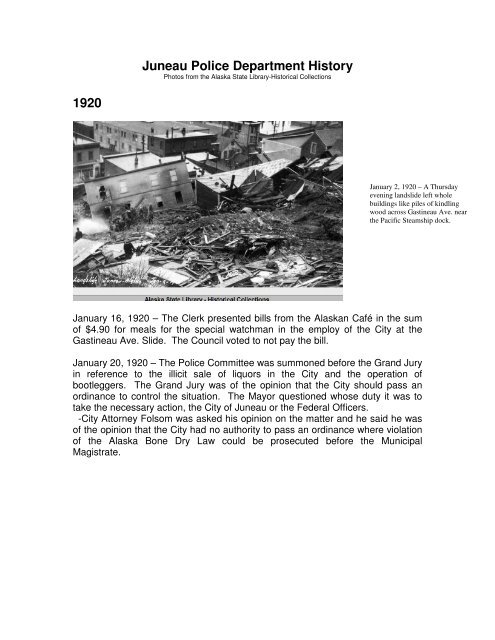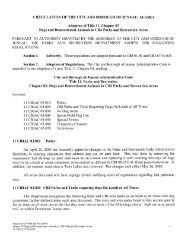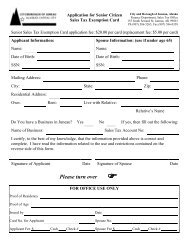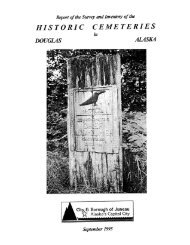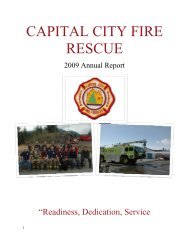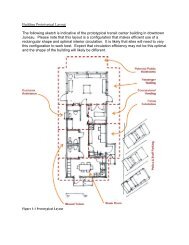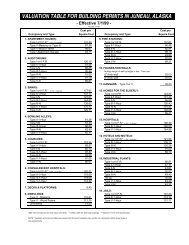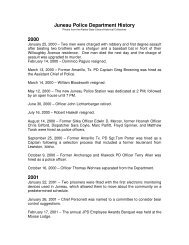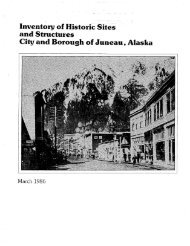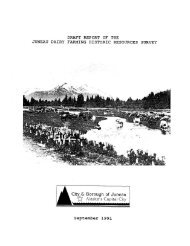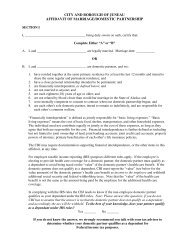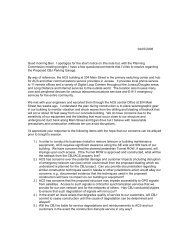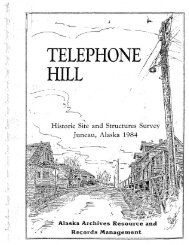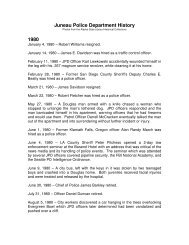Juneau Police Department History 1920 - The City and Borough of ...
Juneau Police Department History 1920 - The City and Borough of ...
Juneau Police Department History 1920 - The City and Borough of ...
Create successful ePaper yourself
Turn your PDF publications into a flip-book with our unique Google optimized e-Paper software.
<strong>Juneau</strong> <strong>Police</strong> <strong>Department</strong> <strong>History</strong>Photos from the Alaska State Library-Historical Collections<strong>1920</strong>January 2, <strong>1920</strong> – A Thursdayevening l<strong>and</strong>slide left wholebuildings like piles <strong>of</strong> kindlingwood across Gastineau Ave. nearthe Pacific Steamship dock.January 16, <strong>1920</strong> – <strong>The</strong> Clerk presented bills from the Alaskan Café in the sum<strong>of</strong> $4.90 for meals for the special watchman in the employ <strong>of</strong> the <strong>City</strong> at theGastineau Ave. Slide. <strong>The</strong> Council voted to not pay the bill.January 20, <strong>1920</strong> – <strong>The</strong> <strong>Police</strong> Committee was summoned before the Gr<strong>and</strong> Juryin reference to the illicit sale <strong>of</strong> liquors in the <strong>City</strong> <strong>and</strong> the operation <strong>of</strong>bootleggers. <strong>The</strong> Gr<strong>and</strong> Jury was <strong>of</strong> the opinion that the <strong>City</strong> should pass anordinance to control the situation. <strong>The</strong> Mayor questioned whose duty it was totake the necessary action, the <strong>City</strong> <strong>of</strong> <strong>Juneau</strong> or the Federal Officers.-<strong>City</strong> Attorney Folsom was asked his opinion on the matter <strong>and</strong> he said he was<strong>of</strong> the opinion that the <strong>City</strong> had no authority to pass an ordinance where violation<strong>of</strong> the Alaska Bone Dry Law could be prosecuted before the MunicipalMagistrate.
<strong>Juneau</strong> <strong>City</strong> Hall <strong>and</strong> the U.S. CourthouseFebruary 25, <strong>1920</strong> – <strong>The</strong> Mayor <strong>and</strong> the <strong>Police</strong> Committee conducted aninvestigation into alleged abusive language used by the Chief <strong>of</strong> <strong>Police</strong>.March 5, <strong>1920</strong> – <strong>The</strong> Chief did not deny the charge <strong>of</strong> using abusive language,but the use was not without provocation.April 2, <strong>1920</strong> – With the influenza epidemic over there was no apparent need foran extra patrolman <strong>and</strong> Patrolman T.E. P. Keegan was dropped from the forcewithout prejudice.April 29, <strong>1920</strong> – Six ballots were held by the Council trying to elect a Chief <strong>of</strong><strong>Police</strong> for the ensuing year <strong>and</strong> none <strong>of</strong> the c<strong>and</strong>idates received a majority. <strong>The</strong>election was put over to the next regular meeting.May 7, <strong>1920</strong> – Robert E. Clark resigned as Chief <strong>of</strong> <strong>Police</strong> effective April 30 th <strong>and</strong>T.E.P. Keegan was appointed as acting Chief. After three ballots <strong>and</strong> noc<strong>and</strong>idate receiving the majority, the Mayor ordered the election for Chief <strong>of</strong><strong>Police</strong> put over until the next regular meeting.May 24, <strong>1920</strong> – T.E.P. Keegan was elected Chief <strong>of</strong> <strong>Police</strong> for the ensuing year.June 4, <strong>1920</strong> – Al Forsythe was appointed <strong>Police</strong> Officer.July 5, <strong>1920</strong> – <strong>The</strong> <strong>City</strong> paid $1 for bringing prisoners to the <strong>City</strong> Jail inautomobiles.August 6, <strong>1920</strong> – Marie Mejia sued Chief Keegan <strong>and</strong> Patrolman Al Forsythe.<strong>and</strong> the Council unanimously voted to defend them. Legal counsel was hired toprosecute appeal cases <strong>and</strong> to defend the case against Keegan <strong>and</strong> Forsythe.
August 20, <strong>1920</strong> – With insufficient funds in the <strong>City</strong> Treasury to pay the bills onh<strong>and</strong>, the Clerk was authorized to negotiate a loan <strong>of</strong> $5,000.-Patrolman Al Forsythe applied for two weeks vacation with pay. <strong>The</strong>re wasconsiderable discussion on the matter <strong>of</strong> granting municipal employeesvacations. <strong>Police</strong> <strong>of</strong>ficers worked a full calendar month including Sundays, so itwas agreed that Patrolman Al Forsythe should be granted a ten day vacationwith full pay, <strong>and</strong> any additional time <strong>of</strong>f would be without pay.1921March 4, 1921 – Chief Keegan requested that an additional patrolman beemployed for a short time, due to the number <strong>of</strong> petty thefts being committed.<strong>The</strong> Council approved a patrolman to be employed for one month only, at thesame salary as paid the present patrolman.April 1, 1921 – Al Forsythe, Night Patrolman tendered his resignation effectivethis date, <strong>and</strong> V.L. Tibbetts was appointed to replace him.April 29, 1921 – T.E.P. Keegan was re-elected Chief <strong>of</strong> <strong>Police</strong> <strong>and</strong> V.L. Tibbettswas elected <strong>Police</strong> Patrolman for the ensuing year.June 17, 1921 – <strong>The</strong> sewer from the residence <strong>of</strong> C.E. Tibbetts was in very badcondition <strong>and</strong> the Chief <strong>of</strong> <strong>Police</strong> notified Capt. C.E. Tibbets that he was requiredto extend his sewer to the level <strong>of</strong> the low tide mark.August 19, 1921 – <strong>The</strong> Street Commissioner was instructed to place a safetybutton, or “silent policemen” bearing the inscription “Turn to Right” at theintersection <strong>of</strong> Front <strong>and</strong> Franklin.December 16, 1921 – <strong>The</strong> Council received complaints about small boatsoccupying the space continuously at Float A, interfering with other boats thatmake calls at certain regular periods to discharge <strong>and</strong> load merch<strong>and</strong>ise. <strong>The</strong>Chief <strong>of</strong> <strong>Police</strong> was instructed to serve notice to the owners <strong>of</strong> boats which havebeen at the float for thirty days, that they must vacate the space within five days.-An Assistant Wharfinger was directed to keep a daily tally <strong>of</strong> the names <strong>and</strong> thedays on which the boats occupy space at Float A.-<strong>The</strong> Clerk presented a list <strong>of</strong> the delinquent personal property taxes whichamounted to $1566.99. <strong>The</strong> Chief <strong>of</strong> <strong>Police</strong> was instructed to notify thedelinquent personal property owners that they had until January 3 rd , 1922, to paytheir taxes.1922January 13, 1922 – Chief <strong>of</strong> <strong>Police</strong> Keegan requested a leave <strong>of</strong> absence fromFebruary 1 st to March 1 st , 1922. He was granted the leave <strong>of</strong> two weeks with fullpay <strong>and</strong> two weeks without pay.
-<strong>The</strong> Chief was instructed to take the necessary steps to collect the delinquentproperty taxes <strong>and</strong> the delinquent taxes on gas boats, <strong>and</strong> that he ascertain ifthat was their home port on May 1 st , 1921.February 3, 1922 – <strong>The</strong> Chief’s report was read for the month <strong>of</strong> January. Duringhis absence he had designated Patrolman V.L. Tibbetts as Acting Chief <strong>of</strong> <strong>Police</strong>but at patrolman’s salaryApril 21, 1922 – T.E.P. Keegan was re-elected Chief <strong>of</strong> <strong>Police</strong> <strong>and</strong> V.L. Tibbettswas elected Patrolman for the ensuing year.May 8, 1922 – <strong>The</strong> Chief <strong>of</strong> <strong>Police</strong> was instructed to notify anyone h<strong>and</strong>linggarbage that they were restricted from h<strong>and</strong>ling garbage between eight in themorning <strong>and</strong> twelve midnight on those streets within the boundary <strong>of</strong> FourthStreet South between Franklin <strong>and</strong> Main <strong>and</strong> Front Street to the <strong>City</strong> Dock.May 26, 1922 – Fire Chief J.L. Gray reported that he <strong>and</strong> the Chief <strong>of</strong> <strong>Police</strong>visited the hotels <strong>and</strong> rooming houses in the <strong>City</strong> <strong>and</strong> read the law requiringropes for fire escape purposes in each room <strong>and</strong> requiring other fire escapefacilities, <strong>and</strong> also informed the proprietors that an inspection would again bemade to see that the law had been fulfilled.-Councilman Reck advised the Council that Mrs. Garnick was throwing garbageinto the cemetery <strong>and</strong> the matter was referred to the Health <strong>and</strong> <strong>Police</strong>Committee.June 16, 1922 – <strong>The</strong> Chief <strong>of</strong> <strong>Police</strong> requested the <strong>City</strong> to allow V.L. Tibbetts,Night Patrolman, a monthly allowance <strong>of</strong> $7.50 to cover the cost <strong>of</strong> operating hismotorcycle in the performance <strong>of</strong> his <strong>of</strong>ficial duties.-<strong>The</strong> attention <strong>of</strong> the Chief <strong>of</strong> <strong>Police</strong> was called to the section <strong>of</strong> the TrafficOrdinance that required having auto brakes in good condition, <strong>and</strong> he wasinstructed to see that this part <strong>of</strong> the ordinance was complied with.July 7, 1922 – <strong>The</strong> Chief was directed to condemn the stable belonging to theMaloney estate located on the Basin road.-<strong>The</strong> Council wanted the Chief to serve notice on the owner <strong>of</strong> the buildinglocated on slide tract which was leaning on the bridge on Gastineau Avenue, toremove it or have it removed.August 18, 1922 – <strong>The</strong> Council wanted the Chief <strong>of</strong> <strong>Police</strong> to check themercantile licenses, make some effort to collect the dog licenses <strong>and</strong> check onthe automobiles.September 1, 1922 – <strong>The</strong> Chief <strong>of</strong> <strong>Police</strong> was instructed to notify Shelley Graves<strong>and</strong> others to discontinue feeding the pigeons on Front Street.
September 15, 1922 – THealth Officer <strong>and</strong> the Ch<strong>of</strong> <strong>Police</strong> were instructedsee whether CharlSwitzer <strong>and</strong> AlbPeterson, operatorsdairies were complying wthe Dairy Ordinance.1923January 5, 1923 – <strong>The</strong> Chief <strong>of</strong> <strong>Police</strong> was requested to submit a reportcontaining the list <strong>of</strong> business houses that had not paid their Federal Licenses, alist <strong>of</strong> auto owners who have not secured auto licenses, <strong>and</strong> names <strong>of</strong> habitualviolators <strong>of</strong> the Traffic Ordinance.-<strong>The</strong> Council wanted to know whether any turkeys were returned to thewarehouse after being stolen <strong>and</strong> located by the <strong>Police</strong> <strong>Department</strong>, <strong>and</strong> to see ifthere was any possibility <strong>of</strong> securing a refund from the party or parties having thestolen turkeys in their possession.February 16, 1923 – <strong>The</strong> Chief <strong>of</strong> <strong>Police</strong> was advised that the matter <strong>of</strong>compelling gas boats to move from the <strong>City</strong> Wharf float to the lower float wasauthorized, <strong>and</strong> that the Council expects some action.March 16, 1923 – Letter from T.E.P. Keegan, Chief <strong>of</strong> <strong>Police</strong> advising that uponhaving a man check on the street lights he found that the <strong>City</strong> Council was beingcharged for six lights more than he was able to locate.April 20, 1923 – T.E.P. Keegan, the only applicant for Chief <strong>of</strong> <strong>Police</strong> was duly reelectedfor the ensuing year.-V.L. Tibbetts was duly re-elected as <strong>Police</strong> Patrolman.October 5, 1923 – Mr. N.H. Castle suggested to the Council that the <strong>City</strong>introduce an ordinance regulating the sale <strong>and</strong> loan <strong>of</strong> firearms <strong>and</strong> moreparticularly pocket weapons. <strong>The</strong> ordinance stipulated that persons sellingfirearms, <strong>and</strong> particularly pocket weapons must keep a record <strong>of</strong> such saleswhich would be open to the inspection <strong>of</strong> the Chief <strong>of</strong> <strong>Police</strong>. Also all loans <strong>of</strong>
pocket weapons must be reported to the Chief <strong>of</strong> <strong>Police</strong>. Mr. Castle alsosuggested that if the <strong>City</strong>’s finances permitted, that the Chief <strong>of</strong> <strong>Police</strong> should begiven one or two more patrolmen to assist in patrolling the <strong>City</strong>.-A claim <strong>of</strong> $5 was made by H.F. Morton against the Southeastern Alaska Fairfor patrolman duty Saturday night, September 22, 1923.December 21, 1923 – Ordered that Fire Chief Gray together with Chief <strong>of</strong> <strong>Police</strong>Keegan make an inspection <strong>of</strong> the business houses <strong>of</strong> <strong>Juneau</strong> for violations <strong>of</strong>the “Storing Gasoline Ordinance” <strong>and</strong> warrants be issued for all violators <strong>of</strong> theordinance.1924January 4, 1924 – Reliable Transfer Company made a claim for $13.75 for stable<strong>and</strong> feed for one horse for 11 days. <strong>The</strong> horse owned by Tom Davien had beenimpounded by Chief Keegan.February 15, 1924 – On January 4 th , 1924, the Common Council authorizedT.E.P. Keegan two weeks vacation with pay. Inasmuch as this warrant for$87.50 had not been paid to Keegan or to his estate, the Clerk was instructed topay the warrant to the person presenting the proper credentials authorizing himto h<strong>and</strong>le the estate <strong>of</strong> T.E.P. Keegan.-Acting Chief <strong>of</strong> <strong>Police</strong> Tibbetts was retained as acting Chief <strong>of</strong> <strong>Police</strong> until afterthe election.March 7, 1924 – <strong>The</strong> sons <strong>and</strong> brother <strong>of</strong> the late T.E.P. Keegan conveyed theirappreciation for the floral <strong>of</strong>fering from the <strong>City</strong>.April 10, 1924 – V.L. Tippetts was elected to the <strong>of</strong>fice <strong>of</strong> Chief <strong>of</strong> <strong>Police</strong>.-Mr. A.D. Mack was elected <strong>Police</strong> Patrolman.June 6, 1924 – Mr. Mack reported finding an old man in destitute condition <strong>and</strong>sick in a cabin on Ferry Way. <strong>The</strong> man wasn’t willing to go to the hospital, soMack was instructed to have the night patrolman make calls during the night tocheck on his condition.July 7, 1924 – J.F. Hoag was appointed night patrolman <strong>and</strong> A.D. Mack, Chief <strong>of</strong><strong>Police</strong>.-<strong>The</strong> Chief <strong>of</strong> <strong>Police</strong> was instructed to police the <strong>City</strong> Wharf during the l<strong>and</strong>ing<strong>and</strong> embarking <strong>of</strong> vessels for the purpose <strong>of</strong> enforcing the ordinance regulatingthe parking <strong>of</strong> taxi cabs <strong>and</strong> the soliciting <strong>of</strong> business on <strong>City</strong> Dock property.August 1, 1924 – Mr. Mack, Chief <strong>of</strong> <strong>Police</strong> made a verbal report to the effect thatMr. Williams <strong>of</strong> Federal Narcotic Investigators advised him that the <strong>City</strong> <strong>of</strong><strong>Juneau</strong> was free from narcotics.
September 19, 1924 – Chief <strong>of</strong> <strong>Police</strong> A.D. Mack thought it advisable to appointRoy Nolan as a special police <strong>of</strong>ficer to investigate fires. Mr. Nolan would servewithout pay <strong>and</strong> as a member <strong>of</strong> the Fire <strong>Department</strong> would be on h<strong>and</strong> at allfires.1925January 2, 1925 – Patrolman J.F. Hoag tendered his resignation as nightpatrolman effective December 31, 1924.-It was ordered that the matter <strong>of</strong> selecting a night patrolman be left to the Chief<strong>of</strong> <strong>Police</strong>.February 20, 1925 – <strong>The</strong> Chief <strong>of</strong> <strong>Police</strong>, Health Officer <strong>and</strong> Fire Chief <strong>and</strong> alsoCouncilman Connors inspected buildings in the <strong>City</strong> to locate fire traps <strong>and</strong>unsanitary conditions.March 20, 1925 – Frank Reeder tendered his resignation as night patrolmaneffective March 22, 1925.-Chief <strong>of</strong> <strong>Police</strong> Mack was authorized to appoint a new night patrolman.April 17, 1925 – James McCloskey was elected Chief <strong>of</strong> <strong>Police</strong> for the ensuingyear.-A.D. Mack was appointed Night Patrolman for the ensuing year.May 1, 1925 – Chief McCloskey reported that small boys were starting fires <strong>and</strong>the Chief was requested to turn the boys over to H.R. Shepard who had taken aninterest in the welfare <strong>of</strong> wayward boys.June 5, 1925 – <strong>The</strong> Chief <strong>of</strong> <strong>Police</strong> was instructed to keep an account <strong>of</strong> gasolineused in his car for one month, in order to determine an equitable gas allowance.August 21, 1925 – <strong>The</strong> Chief was instructed to place a sign on the dolphinoutside <strong>of</strong> the <strong>City</strong> Float stating that boats laying outside <strong>of</strong> the dolphins do so attheir own risk.September 18, 1925 – Agnes R. Fletcher, nurse in charge <strong>of</strong> the Native Hospitaladvised that so-called fortune tellers were operating in <strong>Juneau</strong> <strong>and</strong> were playingupon the credulity <strong>of</strong> Indians <strong>and</strong> others. <strong>The</strong> matter was turned over to the <strong>City</strong>Clerk <strong>and</strong> Chief <strong>of</strong> <strong>Police</strong>.October 2, 1925 – <strong>The</strong> problem <strong>of</strong> low awnings was referred to the Chief <strong>of</strong><strong>Police</strong>.November 6, 1925 – Miles Godkins requested damages for repairs to his carafter colliding with the <strong>City</strong> Truck. <strong>The</strong> matter was referred to the Chief <strong>of</strong> <strong>Police</strong>to gather information to place the blame for the crash.
-A problem with boats tying to the pilings at the foot <strong>of</strong> 12 th St. was referred tothe Chief <strong>of</strong> <strong>Police</strong>.1926April 16, 1926 – A resolution from the <strong>Juneau</strong> Chamber <strong>of</strong> Commercecommended the <strong>City</strong> for enforcing certain sections <strong>of</strong> the traffic ordinance; moreparticularly the part prohibiting minors under sixteen years <strong>of</strong> age from operatingcars. <strong>The</strong> <strong>City</strong> Clerk was instructed to mail a copy <strong>of</strong> the traffic ordinance to eachauto owner in the <strong>City</strong>.-James McCloskey was re-appointed Chief <strong>of</strong> <strong>Police</strong> <strong>and</strong> empowered by theCouncil to appoint a night patrolman subject to the approval <strong>of</strong> the Council.May 7, 1926 – <strong>The</strong> problem with parked cars on Calhoun Ave was referred to<strong>Police</strong> <strong>Department</strong> with instructions to tag the cars. <strong>The</strong> Clerk was instructed toplace a notice in the papers that dumping garbage on the beach outside <strong>of</strong> FrontStreet would not be tolerated.June 18, 1926 – <strong>The</strong> Chief <strong>of</strong> <strong>Police</strong> reported that several “Out <strong>of</strong> Town” carowners had refused to pay for or take out <strong>City</strong> Licenses. <strong>The</strong> Chief wasinstructed to station patrolmen at the city limits with instructions to refuseentrance unless these car owners agreed to pay the <strong>City</strong> license.September 17, 1926 – Councilman Freeburger questioned the non-appearance<strong>of</strong> the Chief <strong>of</strong> <strong>Police</strong> at Council meetings.October 10, 1926 – Treadwell <strong>and</strong> half <strong>of</strong> the city <strong>of</strong> Douglas were destroyed byfire.October 10, 1926
October 26, 1926 – An unknown person fastened several sticks <strong>of</strong> dynamite to asteel I beam under the floor <strong>of</strong> the Peerless Bakery on South Franklin St. <strong>and</strong>windows were blown out <strong>of</strong> several adjacent businesses when the dynamite wasdetonated. Chief McCloskey was unable to solve the case even with the help <strong>of</strong>FBI Agent Hugh Wade who traveled to <strong>Juneau</strong> to assist with the investigation.1927April 29, 1927 – <strong>The</strong> Chief <strong>of</strong> <strong>Police</strong> was authorized to appoint a temporarypatrolman until the next Council meeting when the matter would be discussed.May 6, 1927 – J.F. Hoag was appointed Night Patrolman.August 19, 1927 – <strong>The</strong> <strong>City</strong> hired J.M. Davis as a night watchman for the <strong>City</strong>Wharf at a salary <strong>of</strong> fifty dollars a month.November 4, 1927 – <strong>The</strong> <strong>City</strong> Council extended a vote <strong>of</strong> confidence to the Chief<strong>of</strong> <strong>Police</strong> <strong>and</strong> Night Patrolman for their assistance in the raid made by FederalProhibition Officers on Bobby Elliott’s place.1928January 20, 1928 – A committee from the <strong>Juneau</strong> Woman’s Club requested thatthe <strong>City</strong> appoint a woman police <strong>of</strong>ficer to look after delinquent children,particularly native children. After a full discussion <strong>of</strong> the matter it was referred tothe <strong>Police</strong> Committee.February 3, 1928 – <strong>The</strong> <strong>Police</strong> Committee submitted a verbal report regardingthe matter <strong>of</strong> employing a woman police <strong>of</strong>ficer, recommending that due to a lack<strong>of</strong> funds at this time <strong>of</strong> year it would be impracticable to hire a woman policeman.<strong>The</strong>y further recommended that in specific cases <strong>of</strong> delinquency, the Chief <strong>of</strong><strong>Police</strong> should work with a member <strong>of</strong> the Woman’s Club <strong>and</strong> that person couldcommunicate the action <strong>of</strong> the <strong>City</strong> Council to the Club.April 9, 1928 – George Getchell was elected Chief <strong>of</strong> <strong>Police</strong>.-Fred Campen was named Night Patrolman.June 1, 1928 – <strong>The</strong> Chairman <strong>of</strong> the <strong>Police</strong> Committee reported that federalauthorities had closed up certain portions <strong>of</strong> the restricted district <strong>and</strong> that thissporting element was being scattered over the residential districts.-<strong>The</strong> <strong>Police</strong> Committee further reported that owing to a lack <strong>of</strong> funds it was notadvisable to employ a woman police <strong>of</strong>ficer at this time.October 5, 1928 – N. Rocovich made a complaint against night patrolmanCampen charging him with using pr<strong>of</strong>ane language. <strong>The</strong> matter was referred tothe <strong>Police</strong> Committee for investigation.1929
April 11, 1929 – George A. Getchell was re-elected Chief <strong>of</strong> <strong>Police</strong>.-<strong>The</strong> selection <strong>of</strong> Night Patrolman was left to the Chief <strong>of</strong> <strong>Police</strong> who laterrecommended that Fred Campen be continued as Night Patrolman.July 19, 1929 – On July 1 st 1929, the salary <strong>of</strong> George A. Getchell as Chief <strong>of</strong><strong>Police</strong> was raised to $190 per month with a gas allowance <strong>of</strong> $10 per month.<strong>The</strong> salary <strong>of</strong> Fred Campen, Night Patrolman was increased to $175 per month.September 6, 1929 – Communication datedSeptember 5, 1929, from N.S. Haugen,comm<strong>and</strong>ing <strong>of</strong>ficer “Unalga”, was readcomplaining that Night Patrolman FredCampen had struck one Robert Howell, acoxswain on shore patrol with a blackjack.Chief Getchell explained the incident <strong>and</strong>upheld the action <strong>of</strong> Campen. Afterdiscussion <strong>of</strong> the matter it was turned overto the <strong>Police</strong> Committee.U.S.R.C. UnalgaOctober 18, 1929 – <strong>The</strong> Chief <strong>of</strong> <strong>Police</strong> <strong>and</strong> the <strong>City</strong> Magistrate requested thatthe Council establish a fixed penalty to be assessed for violations <strong>of</strong> the one halfhour parking regulation <strong>and</strong> also for not coming to a stop when entering orcoming out <strong>of</strong> alleyways. After a full discussion <strong>of</strong> the matter it was decided that$1 should be charged for failure to observe the half hour parking rule <strong>and</strong> $2should be the sum charged for failure to come to a stop or near stop entering orcoming out <strong>of</strong> alleyways.1930January 3, 1930 – <strong>The</strong> manager in charge <strong>of</strong> construction <strong>of</strong> the Capital Buildingwas instructed by the Chief <strong>of</strong> <strong>Police</strong> to suspend blasting during the time schoolchildren were going to <strong>and</strong> from school; to cover the shots or cut down theamount <strong>of</strong> powder used, <strong>and</strong> to station flagmen to advise pedestrians <strong>and</strong>motorists before setting <strong>of</strong>f blasts.January 16, 1930 – <strong>The</strong> Chief <strong>of</strong> <strong>Police</strong> submitted a semi-monthly report <strong>of</strong> carstagged in connection with violation <strong>of</strong> the Traffic Code <strong>and</strong> the <strong>Department</strong>’s use<strong>of</strong> taxi cabs. <strong>The</strong> <strong>City</strong> Clerk submitted a report <strong>of</strong> Traffic Code violation casesreported to him <strong>and</strong> fines collected.April 8, 1930 – George A. Getchell was re-elected Chief <strong>of</strong> <strong>Police</strong>.-<strong>The</strong> appointment <strong>of</strong> Night Patrolman was laid over until the next meeting.
May 3, 1930 – <strong>The</strong> Chief recommended the appointment <strong>of</strong> Fred Campen asNight Patrolman.June 23, 1930 – <strong>The</strong> Chief was allowed to hire an extra man at the salary <strong>of</strong>$160 per month, until October 1, 1930.July 10, 1930 – George Grigg was appointed as a patrolman.July 18, 1930 – A letter <strong>of</strong> complaint was filed against Night Patrolman FredCampen <strong>and</strong> referred to the <strong>Police</strong> Committee for investigation.September 19, 1930 – <strong>The</strong> Chief wasauthorized to purchase <strong>and</strong> install threeiron phone boxes <strong>and</strong> phones for the<strong>Police</strong> <strong>Department</strong>, <strong>and</strong> the question <strong>of</strong>their locations was left to the Chief <strong>of</strong><strong>Police</strong>.October 3, 1930 – <strong>The</strong> employment <strong>of</strong> the additional night watchman wascontinued.1931April 10, 1931 – George A. Getchell was re-elected as Chief <strong>of</strong> <strong>Police</strong>.April 17, 1931 – Fred Campen <strong>and</strong> George Grigg were re-elected as nightpatrolmen.May 15, 1931 – For the fiscal year 1931, the Mayor, Chief <strong>of</strong> <strong>Police</strong>, <strong>and</strong> actingcouncilmen were not charged for automobile licenses for their privately ownedcars.
<strong>Juneau</strong> Cold Storage – December 19311932January 23, 1932 – <strong>Juneau</strong>’s first bank robbery took place at the B.M. BehrendsBank. <strong>The</strong> robber was shot <strong>and</strong> died trying to escape.April 29, 1932 – George A. Getchell was re-elected as Chief <strong>of</strong> <strong>Police</strong>.May 2, 1932 – Fred Campen <strong>and</strong> George Grigg were re-elected to the position <strong>of</strong>Night Patrolman.May 9, 1932 – <strong>The</strong> Taku Harbor cannery <strong>of</strong> Libby, McNeil, <strong>and</strong> Libby wasdestroyed by fire.June 3, 1932 – Every steamship line stopping at <strong>Juneau</strong> was advised that in thefuture no stowaways would be allowed to l<strong>and</strong> <strong>and</strong> that steamers would berequired to return the stowaways to the point <strong>of</strong> embarkation at their ownexpense. A copy <strong>of</strong> the notice was sent to managers <strong>of</strong> steamship lines as wellas local agents.August 31, 1932 – Night Patrolman George Grigg resigned.November 1, 1932 – C.J. Davis was hired to replace George Grigg as NightPatrolman.November 7, 1932 – Ordinance No. 208, entitled “An Ordinance Licensing <strong>and</strong>Regulating Pawnbrokers, Second-H<strong>and</strong> Dealers <strong>and</strong> Junk Dealers” <strong>and</strong> requiringthem to keep certain records <strong>and</strong> prescribing punishment for violations, waspassed at first reading.1933April 7, 1933 – <strong>The</strong> position <strong>of</strong> one night patrolman was discontinued so onenight patrolman <strong>and</strong> the Chief <strong>of</strong> <strong>Police</strong> constituted the <strong>Police</strong> <strong>Department</strong>.-<strong>The</strong> salary <strong>of</strong> the Chief <strong>of</strong> <strong>Police</strong> was reduced from $200 per month to $180 permonth <strong>and</strong> the salary <strong>of</strong> the Night Patrolman was reduced from $175 per monthto $157.50 per month.April 14, 1933 – C.J. Davis was elected Chief <strong>of</strong> <strong>Police</strong> for the ensuing year.-Fred Campen was declared re-elected Night Patrolman.July 21, 1933 – <strong>The</strong> Council authorized the employment <strong>of</strong> an additionalpatrolman at $135 per month, to be selected by the Chief <strong>of</strong> <strong>Police</strong>.
November 3, 1933 – <strong>The</strong> Chief <strong>of</strong> <strong>Police</strong> was instructed to make the necessaryarrangements for taking finger prints <strong>of</strong> persons taken into custody, at the Chief’sdiscretion.-<strong>The</strong> Street Committee was directed to look into purchasing an automobile to beused for <strong>City</strong> purposes.1934February 16, 1934 – <strong>The</strong> Council questioned permitting a third taxicab on anyone st<strong>and</strong>, instead <strong>of</strong> only two as had been stipulated by the Chief <strong>of</strong> <strong>Police</strong>.After discussion, the Chief was given sole jurisdiction over this matter.April 6, 1934 – <strong>The</strong> Chief‘s salary was set at $200 per month, Assistant Chief’ssalary at $160 per month, <strong>and</strong> Patrolman’s salary at $150 per month.April 13, 1934 – C.J. Davis- was re-elected Chief <strong>of</strong> <strong>Police</strong>.-Roy H<strong>of</strong>fman was elected Assistant Chief <strong>and</strong> W.J. Markle elected patrolman.April 20, 1934 – Kenneth Junge was appointed as patrolman by Chief Davis.May 1, 1934 – Liquor was again legalized <strong>and</strong> 10 liquor stores opened in <strong>Juneau</strong>.May 4, 1934 – Chief <strong>of</strong> <strong>Police</strong> Davis reported that he had refused to allow theoperation <strong>of</strong> slot machines in the <strong>City</strong> <strong>and</strong> also reported that he had stopped theselling <strong>of</strong> hard liquors after 1 AM as per the <strong>City</strong> Ordinances. After discussion bythe Council, the <strong>Police</strong> Committee <strong>and</strong> the <strong>City</strong> Attorney were directed to draft anew ordinance amending or repealing Ordinance No. 184 to fit the currentconditions. <strong>The</strong> Chief <strong>of</strong> <strong>Police</strong> was instructed to permit the operation <strong>of</strong> liquorsales in accordance only with the rules <strong>and</strong> regulations issued by the TerritorialLiquor Board <strong>and</strong> to allow draft beer to be sold with meals in restaurants <strong>and</strong>cafes after 1 AM.June 1, 1934 – Ordinance No. 216, “prohibiting electrical interference with radioreception, <strong>and</strong> requiring the owners to register all installed radios <strong>and</strong> providingfor punishment for any violations”, was read for the third time.-<strong>The</strong> matter <strong>of</strong> airplanes flying at unsafe low altitudes over the <strong>City</strong> was broughtup. <strong>The</strong> Chief <strong>of</strong> <strong>Police</strong> was directed to enforce the <strong>City</strong> Ordinance covering thismatter <strong>and</strong> to notify the airplane companies to that effect.
A Lockheed Vega float plane at the Main Street dockJune 29, 1934 – Ordinance No. 219, Section 7 was amended to read, “It shall beunlawful for any licensee to employ any person under 21 years <strong>of</strong> age to work inor about any beer parlor or to sell or serve any beer therein or to allow anyfemale person to solicit business therein.-Section 8 was amended to read, “No person within the <strong>City</strong> <strong>of</strong> <strong>Juneau</strong> whethera licensee or not shall serve, give or furnish to any person under the age <strong>of</strong> 21years, any intoxicating liquor without the consent <strong>of</strong> parent or guardian <strong>of</strong> suchminor”.July 6, 1934 – Chief <strong>of</strong> <strong>Police</strong> C.J. Davis announced that he had had difficultylocating a suitable place for a dog pound <strong>and</strong> was given permission to use theold red shed at the <strong>City</strong> Wharf.July 20, 1934 – <strong>The</strong> Council voted to allow employees one week vacations withthe exception <strong>of</strong> the Chief <strong>of</strong> <strong>Police</strong>, who was granted two weeks on account <strong>of</strong>illness.-J.E. Pegues complained about the dog catcher shooting dogs on the <strong>City</strong>Garbage Dump <strong>and</strong> leaving them there.September 7, 1934 – Chief <strong>of</strong> <strong>Police</strong> Davis asked for instructions regarding thecurtains in front <strong>of</strong> bawdy houses where beer was sold. He was instructed to seethat the curtains were drawn.October 19, 1934 – <strong>The</strong> <strong>Police</strong> Committee held a meeting to discuss theproposed appointment <strong>of</strong> a police woman whose duty it would be to superviseplaces <strong>of</strong> amusement where young people gather <strong>and</strong> to exercise generaljurisdiction over the activities <strong>of</strong> minors when not under direct supervision <strong>of</strong> theirparents or guardians. A patrol woman was appointed temporarily for 30 days, ata stipend <strong>of</strong> $5 per day under the authority <strong>and</strong> direction <strong>of</strong> the Chief <strong>of</strong> <strong>Police</strong>.
November 2, 1934 – Applications for <strong>Police</strong> Woman were received from Mrs.Ferguson, President <strong>of</strong> the <strong>Juneau</strong> Woman’s Club, Mrs. Lillian Leonard, Mrs.Jessie Baker, Mrs. Edna Haley, <strong>and</strong> Mrs. Durrin.-<strong>The</strong> <strong>Police</strong> <strong>Department</strong> reported that 388 arrests had been made <strong>and</strong> 150traffic violation tags served during the six months ending November 1 st . 1300meals had been served to prisoners in the <strong>City</strong> Jail during that period <strong>and</strong> finescollected by the <strong>City</strong> Clerk amounted to $2907.10.December 7, 1934 – Chief <strong>of</strong> <strong>Police</strong> Davis reported that conditions in the <strong>City</strong>were fairly good, <strong>and</strong> in response to a question from Councilman Rice stated thatthere was no more gambling than usual.December 21, 1934 – Uniforms for the <strong>Department</strong> were discussed. It wasdecided that effective January 1, 1935, salaries would be raised so the <strong>of</strong>ficerscould purchase their own uniforms; Chief <strong>of</strong> <strong>Police</strong> from $200 to $220, AssistantChief from $160 to $175, <strong>and</strong> Patrolman from $150 to $165. <strong>The</strong> uniform stylewas to be approved by the Chief <strong>and</strong> the <strong>Police</strong> Committee.Photo (l-r) Chief Davis, Assistant Chief Roy H<strong>of</strong>fman, Patrolman Kenneth Junge <strong>and</strong> Patrolman W.J. Markle.1935January 4, 1935 – <strong>The</strong>re was a general discussion on the question <strong>of</strong> increasedsalaries <strong>of</strong> the employees <strong>of</strong> the <strong>Police</strong> <strong>Department</strong> <strong>and</strong> purchase <strong>of</strong> uniforms,equipment, etc. <strong>The</strong> Chief was authorized to order guns <strong>and</strong> other necessaryequipment at a cost not to exceed approximately $200.-<strong>The</strong>re was sewer gas in the <strong>City</strong> Jail, <strong>and</strong> traps installed in the drains remediedthe problem.
April 5, 1935 – At the President <strong>of</strong> the <strong>Juneau</strong> School Board, R.E. Robertson’srequest, the Council appointed the Chief <strong>of</strong> <strong>Police</strong> as truant <strong>of</strong>ficer.April 12, 1935 – Roy H<strong>of</strong>fman was elected Chief <strong>of</strong> <strong>Police</strong>; <strong>and</strong> W.J. Markle,Assistant Chief.-George L. Gilbertson <strong>and</strong> Kenneth Junge-patrolmen.-<strong>The</strong> Council approved the following monthly salaries for the coming year:Chief <strong>of</strong> <strong>Police</strong>-$200, Assistant Chief <strong>of</strong> <strong>Police</strong>-$175, <strong>Police</strong> Patrolmen-$165.-Additional taxicab st<strong>and</strong>s on Front St. were discussed. Again it was left to thediscretion <strong>of</strong> the Chief <strong>of</strong> <strong>Police</strong>.April 19, 1935 – <strong>The</strong> Council discussed purchasing a police patrol car. <strong>The</strong>subject was referred to the <strong>Police</strong> Committee for investigation <strong>and</strong> report.May 3, 1935 – Chief <strong>of</strong> <strong>Police</strong> H<strong>of</strong>fman reported that in the month <strong>of</strong> April, hisdepartment had made 42 arrests, had answered 108 calls <strong>and</strong> served 86 mealsto prisoners.May 17, 1935 – Quotations onthe proposed police patrol carwere read from <strong>Juneau</strong> MotorCo. <strong>and</strong> Connors Motor Co,asking a price <strong>of</strong> $879.75 for aFord <strong>and</strong> $930 for a Chevrolet.After considering these twoquotations <strong>and</strong> the quotationsfrom the McCaul Motor Co. for aDodge car <strong>and</strong> the ServiceMotor Co. for an Internationaltruck, the Ford was purchased.-Trap wire was installed on the outside <strong>of</strong> the new garbage dump dock onThane Rd, to eliminate the problem <strong>of</strong> garbage floating around <strong>and</strong> piling up onthe beach.June 4, 1935 – A special meeting <strong>of</strong> the Common Council was convened toconsider a petition from a number <strong>of</strong> local business <strong>and</strong> pr<strong>of</strong>essional men <strong>and</strong>taxpayers, requesting that the <strong>City</strong> supervise an election <strong>of</strong> the employees <strong>of</strong> theAlaska <strong>Juneau</strong> Gold Mining Company on the question <strong>of</strong> determining whether ornot they wished to have the strike called on May 22, terminated <strong>and</strong> to return towork.After much discussion by the Council <strong>and</strong> the public, the resolution was deferreduntil the regular meeting <strong>of</strong> the Council on June 7.
June 7, 1935 – <strong>The</strong> resolution introduced at the June 4 th special meeting that the<strong>City</strong> supervise a special election <strong>of</strong> mining company employees was passed.June 21, 1935 – L.H. Metzgar, Superintendent <strong>of</strong> the Alaska <strong>Juneau</strong> Gold MiningCompany appeared before the Council <strong>and</strong> stated that the committeerepresenting former employees <strong>of</strong> the Company had come to see him to ask howwork could be resumed at the mine. He said that the Company was ready toresume operations as soon as enough men had applied for work <strong>and</strong> that theycould do so without being molested or interfered with.-Ted Danielson said that 290 men had signified their intentions <strong>of</strong> going to work<strong>and</strong> he stated that many others would do so if given an opportunity. He said thatthe men wanted the assurance that the <strong>City</strong> would give them protection whilesigning up for employment <strong>and</strong> after the mine had opened.-<strong>The</strong> Council authorized the Chief to put on enough extra <strong>of</strong>ficers to give thenecessary protection.A-J Mine Strike – June 24, 1935August 1, 1935 – Will Rogers<strong>and</strong> pilot Wylie Post visited<strong>Juneau</strong> in a h<strong>and</strong>-built, hybridaircraft that crashed a fewmiles from Point Barrow,killing both men instantly.
Will Rogers’ visit to <strong>Juneau</strong> – August 1935September 6, 1935 – M.S. Whittier spoke to the Council on the subject <strong>of</strong>ambulance service. He felt the <strong>City</strong> needed a better system for answering callspromptly. It was suggested that a stretcher be kept in the police patrol car, whichalways answered emergency calls, fire alarms etc.September 20, 1935 – A letter wasreceived from Northwest RadioAdvertising Co., Seattle, asking formore information about the taxassessment on KINY station. It urgedthe Council to either exempt theproperty from taxation or place only anominal valuation, in view <strong>of</strong> the publicservice rendered by the station <strong>and</strong> theunpr<strong>of</strong>itable state <strong>of</strong> the station’sbusiness so far.October 13, 1935 – <strong>The</strong> bridge linking the <strong>City</strong> <strong>of</strong> <strong>Juneau</strong> to Douglas Isl<strong>and</strong> was<strong>of</strong>ficially opened.<strong>Juneau</strong>-Douglas Bridge Opening CelebrationNovember 8, 1935 – Garbage wagons were being allowed to go without covers.Chief <strong>of</strong> <strong>Police</strong> H<strong>of</strong>fman promised to notify the garbage collectors to correct theproblem. He also said that something should be done about the garbage
conditions at restaurants, that collections should be made by 8 AM; that many <strong>of</strong>the lavatories in public places like card rooms, pool rooms, <strong>and</strong> beer parlors werein an unsanitary condition; <strong>and</strong> that beer dispensing places should use more carein rinsing their glasses.November 15, 1935 – Chief <strong>of</strong> <strong>Police</strong> H<strong>of</strong>fman suggested that the lot at thecorner <strong>of</strong> 2d <strong>and</strong> Franklin be reserved for a playground for small boys only.1936February 7, 1936 – Cars were being parked on city streets for long periods <strong>of</strong>time. Chief H<strong>of</strong>fman explained that the <strong>of</strong>ficers had hauled many cars to garages<strong>and</strong> that storage space was now at a premium. He promised to look into thematter further <strong>and</strong> see what could be done about using vacant lots for storagepurposes.February 21, 1936 – <strong>Police</strong> Chief H<strong>of</strong>fman reported that doctors <strong>and</strong> dentists hadtold him that there was an epidemic <strong>of</strong> trench mouth in the <strong>City</strong>, caused byimproper glass washing in the beer parlors <strong>and</strong> restaurants <strong>of</strong> the <strong>City</strong>. He wasauthorized to take whatever steps were necessary to enforce the sanitation lawsimmediately.April 3, 1936 – Chief <strong>of</strong> <strong>Police</strong> H<strong>of</strong>fman reported that the <strong>Police</strong> <strong>Department</strong> hadmade 487 arrests since April 1, 1935, mostly for drunk <strong>and</strong> disorderly <strong>of</strong>fenses,<strong>and</strong> that fines collected had amounted to $2,564 for the past fiscal year endingMarch 31, 1936.April 17, 1936 – H<strong>of</strong>fman was re-elected as Chief, William J. Markle was retainedas Assistant Chief, <strong>and</strong> Kenneth Junge <strong>and</strong> George L. Gilbertson as patrolmen.-New uniforms were purchased for the <strong>Department</strong>.May 1, 1936 – J.R. Baxter applied to transfer his liquor license to Mrs. Lena Pigg.Chief H<strong>of</strong>fman stated that the license had been issued originally to Al Forsythe,then transferred to J.R. Baxter, although the common belief was that a noncitizen,“Big Mike”, was the real owner <strong>of</strong> the business. <strong>The</strong> transfer wasrejected.-Chief <strong>of</strong> <strong>Police</strong> H<strong>of</strong>fman reported that the <strong>Police</strong> <strong>Department</strong> made 36 arrestsin April. He said that the dog situation in town was getting serious; that it wasdifficult to control <strong>and</strong> suggested that the <strong>City</strong> require all dogs on the streets to bekept under leash.May 15, 1936 – Assistant Chief <strong>of</strong> <strong>Police</strong> William J. Markle <strong>and</strong> PatrolmanGeorge Gilbertson resigned.June 5, 1936 – John Pastl, owner <strong>of</strong> the New York Tavern, charged that thepolice had shown discrimination in closing card rooms at 1 AM, allowing some
places to operate after hours. Chief <strong>of</strong> <strong>Police</strong> H<strong>of</strong>fman denied the charge <strong>and</strong>said that all card rooms, pool rooms, etc., were not being allowed to operate after1 AM, in accordance with the <strong>City</strong> Ordinance.-Thomas C. Thomsen <strong>and</strong> C.V. Kay were elected patrolmen.July 17, 1936 – Chief <strong>of</strong> <strong>Police</strong> H<strong>of</strong>fman reported that he <strong>and</strong> Territorial SanitaryEngineer Grimes had conducted inspections <strong>of</strong> sanitary conditions in restaurants,beer parlors etc, <strong>and</strong> found conditions gradually improving. He said that thefollowing week he <strong>and</strong> Mr. Grimes would give attention to garbage cans <strong>and</strong>sewer problems. He also reported that the <strong>City</strong> Jail needed some improvementsthat would make it possible to h<strong>and</strong>le women prisoners to better advantage.November 20, 1936 – Chief H<strong>of</strong>fman said he had gotten in touch with owners<strong>and</strong> managers <strong>of</strong> the various beer parlors <strong>and</strong> warned them against selling beerto minors.He also said that several <strong>of</strong> the names on the list presented by the Alaska NativeSisterhood were people that had stolen beer from the <strong>City</strong> Dock <strong>and</strong> were now injail.November 22, 1936 – A 100 footwide l<strong>and</strong>slide demolished theNickinovich Apartments, aneighboring rooming house, <strong>and</strong> othFranklin Street buildings, killingsixteen people following a day <strong>of</strong>heavy rain.1937January 15, 1937 – Ordinance No. 235 that would regulate the keeping <strong>and</strong>licensing <strong>of</strong> dogs, declaring dogs at large a public nuisance, providing penaltiesfor violation <strong>and</strong> repealing ordinances in conflict was proposed. Chief <strong>of</strong> <strong>Police</strong>H<strong>of</strong>fman spoke <strong>of</strong> the difficulties in hiring <strong>and</strong> keeping a dog catcher.-Ralph Jamison asked to have West 7 th Street near Dutch’s Garage, cleared <strong>of</strong>automobiles parked there that were preventing residents from having access to
their property. Chief <strong>of</strong> <strong>Police</strong> H<strong>of</strong>fman promised to take care <strong>of</strong> the matter thenext day.February 8, 1937 – Chief H<strong>of</strong>fman checked up on beer parlors to discoverpossible violations <strong>of</strong> the law regarding minors <strong>and</strong> arrested one man, withresultant conviction <strong>and</strong> fine in the Magistrate’s Court. He said that the law wasbeing observed quite well, but it was impossible for the police to see everythingthat was going on, <strong>and</strong> that it was difficult to ascertain the true ages <strong>of</strong> youthfound in the places. He said he had issued strict instructions to all proprietors <strong>of</strong>beer parlors to give the law the benefit <strong>of</strong> any doubts <strong>and</strong> to keep all youngpeople <strong>of</strong> questionable age out <strong>of</strong> their places.March 19, 1937 – Chief <strong>of</strong> <strong>Police</strong> H<strong>of</strong>fman informed the Council that he hadsecured the services <strong>of</strong> a dogcatcher to help enforce the new dog-on-leashordinance.April 7, 1937 – <strong>The</strong> Yellow Cab Co. presented a claim against the <strong>City</strong> for$191.25, for damages to a cab suffered in a collision with the police patrol carlast October.April 16, 1937 – Dan Ralston was named Chief <strong>of</strong> <strong>Police</strong>, Roy H<strong>of</strong>fman, AssistantChief <strong>of</strong> <strong>Police</strong>, Kenneth Junge <strong>and</strong> J.W. Wilson Patrolman.-Salaries were fixed as follows: Chief <strong>of</strong> <strong>Police</strong>-$200, Assistant Chief <strong>of</strong> <strong>Police</strong>-175, Patrolman-$165.April 26, 1937 – Chief Ralston presented a list <strong>of</strong> things he believed necessaryfor the <strong>Police</strong> <strong>Department</strong> including: 9 blankets, 10 mattresses, 10 canvasmattress covers, four new police <strong>of</strong>ficer uniforms-total estimate $450-500. Healso asked that the patrol car be given a thorough overhaul including installing anew motor, <strong>and</strong> that provisions be made for another women’s cell in the jail.-Chief Ralston urged that Workmen’s Compensation protection be given topolice <strong>of</strong>ficers.December 17, 1937 – A new GMC police patrol car was purchased from theConnors Motor Co. at a purchase price <strong>of</strong> $950. Connors Motors allowed the<strong>City</strong> $275 on the old police car with the <strong>City</strong> to pay $50 per month on the balancedue.1938January 21, 1938 – Old cars were being dumped on the property across from theEureka Apartments on Willoughby Ave.February 4, 1938 – Foster McGovern, the Secretary <strong>of</strong> the Alaska branch <strong>of</strong> theSeattle Chamber <strong>of</strong> Commerce, was asked for the aid <strong>of</strong> the Seattle Chamber in
stopping the flow <strong>of</strong> men to the north who were looking for work <strong>and</strong> to advisethem that there were no relief funds nor work in Alaska at this time.-<strong>City</strong> Attorney Foster told the Council that no action could be taken against theEconomy Garage or Dutch Rodebaugh for keeping old cars on his lot located onWilloughby Ave. across from the Eureka Apartments.February 18, 1938 – James Carlson, a representative <strong>of</strong> the beer parloroperators told the Council that the <strong>City</strong> <strong>of</strong> Douglas kept their places open all night<strong>and</strong> pr<strong>of</strong>ited by the closing hours <strong>of</strong> <strong>Juneau</strong> beer parlors. He said that the beerparlors were the only places available for unemployed men to go to get warm oncold nights. <strong>The</strong> Chief <strong>of</strong> <strong>Police</strong> was instructed to notify all beer parlors <strong>and</strong>liquor stores that the hours <strong>of</strong> closing would be the same time as stated in theordinance-1 AM daily <strong>and</strong> 2:30 AM on Sundays <strong>and</strong> holidays.March 4, 1938 – <strong>The</strong> Chief <strong>of</strong> <strong>Police</strong> required brake testing on all cars by localfirms having the Safety Lane Brake & Light testing equipment.April 15, 1938 – Elected for the ensuing year were: Chief <strong>of</strong> <strong>Police</strong>-Dan Ralston,Assistant Chief <strong>of</strong> <strong>Police</strong>-Roy H<strong>of</strong>fman, Patrolman-Kenneth Junge <strong>and</strong> T.A.Jones. Monthly salaries were fixed at: Chief <strong>of</strong> <strong>Police</strong>-$205, Assistant Chief <strong>of</strong><strong>Police</strong>-$180, Patrolman-$170.May 3, 1938 – <strong>The</strong> first delivery <strong>of</strong> mail via PanAmerican Airways was made from <strong>Juneau</strong> toFairbanks.May 6, 1938 – <strong>The</strong> <strong>Juneau</strong> Chamber <strong>of</strong> Commerce complained to the Councilasking that the dog ordinance be more strictly enforced. <strong>The</strong> Chief <strong>of</strong> <strong>Police</strong>sought to appoint a dogcatcher to take care <strong>of</strong> the dog situation.June 3, 1938 – A question arose as to whether the <strong>City</strong> should continue payingthe Royal Blue Cab Company $10 per month ambulance fee. After considerablediscussion it was decided that the payments should continue.-<strong>The</strong> Chief <strong>of</strong> <strong>Police</strong> was directed to hold Fourth <strong>of</strong> July activities at the ball parkinstead <strong>of</strong> on Main Street this year.June 17, 1938 – John E. Pegues <strong>of</strong> the American Legion Fourth <strong>of</strong> JulyCommittee, asked permission to rope <strong>of</strong>f Front Street between Franklin <strong>and</strong>Seward, to hold the evening sports events. He promised that the events would
start promptly on time <strong>and</strong> the crowd would be confined strictly to that space,thus in case <strong>of</strong> a fire two streets would be kept clear to lower Front Street. Chief<strong>of</strong> <strong>Police</strong> Ralston <strong>and</strong> Fire Chief Mulvihill both expressed the opinion that theconsequent danger <strong>of</strong> holding the events on Front Street would be too great.November 16, 1938 – <strong>The</strong> Mayor <strong>and</strong> Council met with a number <strong>of</strong> citizens <strong>and</strong>townspeople to figure out someway to take care <strong>of</strong> the unemployed. JackLoveless <strong>of</strong> Union #882 said that about 50-60 men were being fed daily at theunion hall through donations from the Union, the merchants <strong>and</strong> variousindividuals.1939April 11, 1939 – Dan Ralston was elected Chief <strong>of</strong> <strong>Police</strong>, Roy H<strong>of</strong>fman AssistantChief <strong>of</strong> <strong>Police</strong>, <strong>and</strong> Kenneth Junge <strong>and</strong> T.A. Jones patrolmen.April 14, 1939 – <strong>The</strong> policemen’s salary was raised $5 per month over theprevious year.June 19, 1939 – No charge was made for automobile dealers’ license plates, buteach dealer was limited to one set <strong>of</strong> plates for sales demonstrations only. Incases <strong>of</strong> emergency where the plates had to be used for other than ademonstration, permission had to be obtained from the Chief <strong>of</strong> <strong>Police</strong>.July 7, 1939 – <strong>The</strong> General Construction Company was the successful bidder forthe Small Boat Harbor project that commenced on August 1 st .September 15, 1939 – Thomas A. Jones resigned as police patrolman.-Two cars, partially dismantled were parked on Evergreen Avenue for weeks<strong>and</strong> were a traffic hazard. Chief <strong>of</strong> <strong>Police</strong> Ralston was directed to determine whoowned the cars <strong>and</strong> have them removed.September 29, 1939 – John L. McCormick was hired as a police patrolman.November 10, 1939 – Nelson Charles was hanged for the Ketchikan murder <strong>of</strong>his mother-in-law, Cecilia Johnson.November 17, 1939 – Assistant Chief <strong>of</strong> <strong>Police</strong> Roy H<strong>of</strong>fman resigned to accepta position in Kodiak.November 22, 1939 – Kenneth Junge was promoted to Assistant Chief <strong>of</strong> <strong>Police</strong>.


